Snail-Like Progress by Ivy League Colleges in Increasing Enrollments of Low-Income Students
New data obtained by JBHE from the U.S. Department of Education finds that, despite extraordinary and highly publicized efforts offering new financial aid programs geared to low-income families, very few students from families in the lower socioeconomic brackets are winning places at the eight Ivy League colleges.
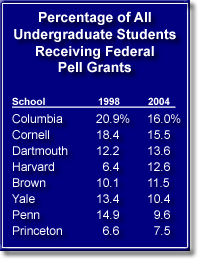 The best performance is at Columbia. The data shows that 16 percent of the students at Columbia University receive federal Pell Grants, a program for students from families that in most cases earn under $40,000 a year. Columbia has the highest percentage of low-income students among the eight Ivy League colleges. But JBHE calculations show that the percentage of the student body receiving Pell Grants at Columbia has dropped nearly 5 percentage points since 1998. The percentage of low-income students also has declined since 1998 at Cornell, Yale, and Penn. At Penn the decrease was huge. The percentage of low-income students at Penn dropped from 14.9 percent in 1998 to 9.6 percent in 2004. The best performance is at Columbia. The data shows that 16 percent of the students at Columbia University receive federal Pell Grants, a program for students from families that in most cases earn under $40,000 a year. Columbia has the highest percentage of low-income students among the eight Ivy League colleges. But JBHE calculations show that the percentage of the student body receiving Pell Grants at Columbia has dropped nearly 5 percentage points since 1998. The percentage of low-income students also has declined since 1998 at Cornell, Yale, and Penn. At Penn the decrease was huge. The percentage of low-income students at Penn dropped from 14.9 percent in 1998 to 9.6 percent in 2004.
Princeton University launched an ambitious and revolutionary student aid program nearly a decade ago. It eliminated loans for all students from families with incomes under $50,000. But the plan appears not to be making much headway in attracting large numbers of low-income students to Princeton. In 2004 only 7.5 percent of the undergraduate students at Princeton received federal Pell Grants, the lowest level in the Ivy League. The percentage of low-income students in 2004 is only slightly higher than the rate that existed in 1998 before the new financial aid plan went into effect.
Harvard, which has a financial plan similar to Princeton’s, has made considerable progress in increasing the number of low-income students on campus. In 2004, 12.6 percent of Harvard undergraduates received federal Pell Grants. This is nearly double the rate that prevailed at Harvard in 1998.

  |
“There is more textbook space devoted to photos, illustrations, and graphics than there’s ever been, but frequently they have nothing to do with the lesson. They’re just there to show diversity and meet a quota of the right number of women, minorities, and the disabled.”
— Diane Ravitch, research professor of education at New York University, discussing a numerical quota system textbook publishers use to win contracts from state education boards, in The Wall Street Journal, 8-19-06
|
Miami University Announces New Financial Grants for Low-Income Students
 Miami University, a state-operated educational institution in Oxford, Ohio, has announced a new financial aid plan for low-income students. Under the Miami Access Initiative, all students from the state of Ohio who come from families with incomes of less than $35,000 will have their tuition and other expenses paid for from university funds. Miami University, a state-operated educational institution in Oxford, Ohio, has announced a new financial aid plan for low-income students. Under the Miami Access Initiative, all students from the state of Ohio who come from families with incomes of less than $35,000 will have their tuition and other expenses paid for from university funds.
The Miami Access Initiative was made possible from a $10 million gift from the estate of Lois K. Klawon, a 1939 graduate of Miami University who died last year. She stipulated that her gift to the university be used to help low-income students.
The new program will begin in the fall of 2007. It is expected that between 125 and 150 students will qualify for Miami Access Initiative grants.
Only 3.4 percent of the students at Miami University are black. But the new financial aid program may serve to attract more African-American students to the campus.

Affirmative Action for Whites
 Senate majority leader Bill Frist, who is contemplating a run for the presidency in 2008, opposes the use of race as a factor in admissions decisions to colleges and universities. But according to a new book by Daniel Golden of The Wall Street Journal, there is no objection when one of his sons is admitted to Princeton University with qualifications significantly below those of his classmates. Frist, a graduate of Princeton, has donated $25 million to his alma mater. The new student center on campus is named after him. Senate majority leader Bill Frist, who is contemplating a run for the presidency in 2008, opposes the use of race as a factor in admissions decisions to colleges and universities. But according to a new book by Daniel Golden of The Wall Street Journal, there is no objection when one of his sons is admitted to Princeton University with qualifications significantly below those of his classmates. Frist, a graduate of Princeton, has donated $25 million to his alma mater. The new student center on campus is named after him.
According to Golden, Frist’s oldest son was admitted to Princeton despite the fact that he was not in the top 20 percent of his graduating class at St. Albans, a preparatory school in Washington, D.C. While at Princeton, he was arrested for drunk driving and graduated without academic honors. Now his younger brother is enrolling at Princeton. He too is a St. Albans graduate and did not finish in the top 20 percent of his graduating class.
In his book The Price of Admission: How America’s Ruling Class Buys Its Way Into Elite Colleges, Golden estimates that up to one third of the students at some of the nation’s most elite colleges would not be admitted under a strict merit-based admissions system.

A Novel Plan to Increase Racial Diversity at an Almost All White Campus
 The University of Wisconsin at La Crosse is located in the extreme western part of Wisconsin near the Minnesota border. It is hundreds of miles from the state’s main black population center in Milwaukee. As a result, less than one percent of the 9,000 students at the university are black. The University of Wisconsin at La Crosse is located in the extreme western part of Wisconsin near the Minnesota border. It is hundreds of miles from the state’s main black population center in Milwaukee. As a result, less than one percent of the 9,000 students at the university are black.
But the state board of regents has embarked on an ambitious new plan to increase racial diversity on campus. Over the next three years tuition at the university will be raised by a total of $1,320. The money will be used to increase outreach and recruiting efforts to minority students and to hire black and other minority faculty, which the university hopes will attract more black students to campus. In addition, the increased tuition will be used to enhance the financial aid pool for low-income and minority students.
Before going into effect, the plan must be approved by the state legislature and the governor.

New York City to Offer the PSAT Test Free to All Public School Students
The Preliminary Scholastic Assessment Test (PSAT) is used not only as a practice examination for the SAT, but it is also used as the qualifying test for National Merit Scholarships. The PSAT is typically offered on a Saturday and it costs students $12 to register to take the test.
New York City has reached an agreement with The College Board to give the test to any public school student in the tenth or eleventh grade free of charge. In addition, the test will be administered on a weekday during regular school hours.
Education officials in New York believe that the no-fee test given on a school day will significantly increase the number of city school students who take the PSAT and therefore become eligible for the National Merit Scholarship program.

The Gender Gap in Master’s and Professional Degree Awards to African Americans
In last week’s edition, JBHE reported the large gender gap in bachelor’s degree awards to African Americans. The gender gap is even wider among black master’s degree recipients. In the 2003-04 academic years, black women earned 36,004 master’s degrees compared to 14,653 for black men. Thus, black women accounted for 71 percent of all master’s degrees awarded to African Americans.
The gender gap in professional degree awards for African Americans is large but not as wide as in bachelor’s and master’s degree attainments. In 2004 black women earned 62 percent of all professional degrees awarded to African Americans.
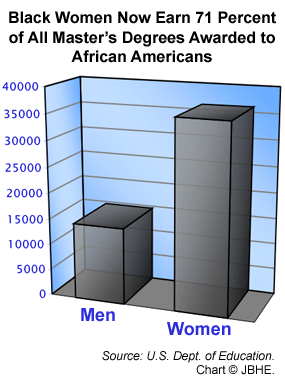


Middle States Commission
on Higher Education

Executive Associate Director
The Middle States Commission on Higher Education invites applicants for the position of Executive Associate Director to serve as a liaison to member colleges and universities in the region.
The Commission is a regional organization accrediting over 500 colleges and universities in DE, DC, MD, NJ, NY, PA, Puerto Rico, US Virgin Islands, and overseas. For more information, visit our website at www.msche.org.
Specific duties include consulting with institutional representatives throughout the self study and peer review process. An active travel schedule is required. Other duties involve organizing and presenting workshops, developing accreditation policies and related publications, providing professional support for task forces, representing the Commission at public events, and special project assignments.
The position is equivalent to a senior-level academic administrator, requiring significant teaching or administrative background, excellent writing and speaking abilities, the ability to work independently and consultatively, and adaptability to changing environments and responsibilities. Individuals fluent in Spanish are encouraged to apply, although this is not a requirement. An earned doctorate, terminal degree, or equivalent substantive experience in senior level administration is required. Prior experience with accreditation or other peer review processes preferred.
The position offers a competitive salary and generous benefits.
Review of applications will begin September 15 and will continue until an appointment is made. Applications should consist of the curriculum vitae/resume, a cover letter addressing your background and skills relevant to this position, and a list of five professional references with phone numbers and e-mail addresses. Nominations and expressions of interest, which will be treated in confidence, should be sent electronically (MS Word), addressed to Executive Director Jean Morse, at:
middlestates@academic-search.com
Assisting Middle States is:
Dr. Tobie van der Vorm, Senior Consultant
Academic Search, Inc.
ptv@academic-search.com
(202) 263-7473

No Recovery in Black Enrollments at Virginia Tech
 In 2002 there were 346 black first-year students at Virginia Tech. In 2003 there were 309 black freshmen. Then, in 2004, the governing board of the university decided to end race-sensitive admissions at the state-operated university. After a public furor, the trustees decided to once again consider race as a positive factor in the admissions process. In 2002 there were 346 black first-year students at Virginia Tech. In 2003 there were 309 black freshmen. Then, in 2004, the governing board of the university decided to end race-sensitive admissions at the state-operated university. After a public furor, the trustees decided to once again consider race as a positive factor in the admissions process.
But the damage had been done. Many prospective black students felt that the welcome mat had been pulled away at Virginia Tech. As a result, in 2004 there were only 173 black freshmen at the university, exactly half the number from two years before. In both 2005 and this fall there were less than 200 black freshmen who matriculated at Virginia Tech.

The Higher Education of Kentucky’s First Black Supreme Court Justice
 Earlier this month William E. McAnulty Jr. was appointed to serve on the Supreme Court of the state of Kentucky. Formerly a judge on the Kentucky Court of Appeals, McAnulty is the first African American to sit on Kentucky’s highest bench. Earlier this month William E. McAnulty Jr. was appointed to serve on the Supreme Court of the state of Kentucky. Formerly a judge on the Kentucky Court of Appeals, McAnulty is the first African American to sit on Kentucky’s highest bench.
McAnulty, a native of Indianapolis, is a graduate of the University of Indiana. He earned his law degree at the University of Louisville. He has been a judge since 1975.
McAnulty will fill out the remainder of the term of a justice who is retiring. The term runs out December 31. But Justice McAnulty is currently running for a full term on the court.

Racial Milestone at Oxford University
 Delapo and Tosin Awoyinka will enroll at Oxford University in England this fall. They are believed to be the first black twins to ever enroll at Oxford. Both students plan to study economics. Delapo and Tosin Awoyinka will enroll at Oxford University in England this fall. They are believed to be the first black twins to ever enroll at Oxford. Both students plan to study economics.

In Memoriam
Clinton Bristow Jr. (1949-2006)
 Clinton Bristow Jr., the president of Alcorn State University in Lorman, Mississippi, died earlier this month from heart failure while jogging on the university’s track. He was 57 years old. Clinton Bristow Jr., the president of Alcorn State University in Lorman, Mississippi, died earlier this month from heart failure while jogging on the university’s track. He was 57 years old.
Dr. Bristow had led the historically black university since 1995. He had previously served for 15 years as dean of the College of Business at Chicago State University.
President Bristow held a bachelor’s degree, a law degree, and an educational doctorate from Northwestern University. He also held an MBA from Governors State University in University Park, Illinois.

Grants
• With a grant from Microsoft, Carnegie Mellon University will establish the Entertainment and Technology Diversity Scholarship. Under the program, a minority or female student will receive a scholarship for graduate training in graphic arts, game design, or computer programming at the university’s Entertainment Technology Center. Carnegie Mellon is the only university in the world to offer a master’s degree in entertainment technology.
• Hampton University, the historically black educational institution in Virginia, received a $310,655 grant from the National Science Foundation to fund genomics and bioinformatics workshops for up to 120 undergraduate faculty members.

|
Last-Ditch Effort Fails to Deny Ballot Access to the Public Referendum That Calls for Ending Race-Sensitive Admissions at the University of Michigan
 This November voters in Michigan will be presented with a referendum, which if approved by a majority of the electorate, would ban the use of race in admissions decisions at the University of Michigan and other state-operated universities. Despite recent polls that show the so-called Michigan Civil Rights Initiative will go down to defeat, opponents of the measure continued their efforts to remove the referendum from the ballot. This November voters in Michigan will be presented with a referendum, which if approved by a majority of the electorate, would ban the use of race in admissions decisions at the University of Michigan and other state-operated universities. Despite recent polls that show the so-called Michigan Civil Rights Initiative will go down to defeat, opponents of the measure continued their efforts to remove the referendum from the ballot.
A suit was filed in federal court claiming that voters were tricked into signing petitions that were circulating in order to gain the initiative a place on the ballot. Witnesses testified that they were told the initiative would help to preserve affirmative action or to “help black kids get into college.” A similar suit was thrown out of state court. The judge in that case ruled that, despite the anecdotal evidence from some witnesses that fraud had taken place, the plaintiffs failed to produce evidence that the fraud was so widespread that it would invalidate enough signatures to keep the referendum off the ballot.
This week a federal judge in Michigan ruled that despite the evidence that fraud had taken place, he did not have jurisdiction to remove the measure from the ballot.

Howard University Moves Up in
U.S. News Rankings
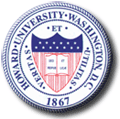 There are currently 248 educational institutions in the United States that are rated as “national universities” in the Carnegie Foundation evaluation system. These research universities draw students from across the nation and offer a wide range of undergraduate and graduate degree programs. There are currently 248 educational institutions in the United States that are rated as “national universities” in the Carnegie Foundation evaluation system. These research universities draw students from across the nation and offer a wide range of undergraduate and graduate degree programs.
Howard University, the historically black institution in Washington, D.C., is ranked in 88th position this year in the annual ratings compiled by U.S. News & World Report. This rating is up from the 93rd position a year ago.
Howard, the only historically black institution in the top group, was ranked above such well-known institutions as the University of Oklahoma, the University of Massachusetts, the University of Arizona, the University of South Carolina, Florida State, and the University of Oregon.

Short Odds for the Selection of an African American to Head Harvard University
 The popular online gambling website Bodog.com is taking bets on who will be the next president of Harvard University. The favorite candidate, according to oddsmakers, is Elena Kagan, dean of Harvard Law. She is currently rated as a 3 to 1 shot to be named the next president of Harvard. The popular online gambling website Bodog.com is taking bets on who will be the next president of Harvard University. The favorite candidate, according to oddsmakers, is Elena Kagan, dean of Harvard Law. She is currently rated as a 3 to 1 shot to be named the next president of Harvard.
According to Bodog.com, Steven E. Hyman, Harvard’s provost, is rated the 7 to 2 second choice. John Etchemendy, the provost at Stanford, is currently at 4 to 1.
Two African-American university presidents are among the frontrunners. Ruth Simmons of Brown University is listed at 9 to 2 odds. Shirley Ann Jackson, president of Rensselaer Polytechnic, is at 6 to 1.
Bodog.com reports that about 600 bets have been placed online as to who will be Harvard’s next president.


The University of Maine

Director of Equal Opportunity
The University of Maine seeks applications and nominations for Director of Equal Opportunity. The Director, who reports to the President and is a member of the Management Group, is responsible for monitoring and advocating for the University’s commitment to equal opportunity and affirmative action; for compliance with nondiscrimination laws, guidelines and policies; and for participating in the leadership team that coordinates the University’s efforts to create and sustain a diverse, inclusive community. This individual serves as the university’s Title IX and ADA Coordinator. Specific responsibilities are outlined in the job description available at: www.umaine.edu/hr/jobs.
Applicants must have a graduate degree, terminal degree preferred, and at least five years of professional experience in work related to equal opportunity or human resources, preferably in a complex organization within a higher education or non-profit setting. Previous experience in complaint investigation and alternative dispute resolution is essential. Excellent and demonstrated communication skills and an understanding of relevant laws and regulations are required. Candidates must demonstrate sensitivity to differences in race, gender, disability, religion, sexual orientation, national origin, and other bases for cultural difference.
The University of Maine, the flagship in the state’s public university system, offers an excellent benefits package. The university is located within an hour of Maine’s beautiful coast and two hours from western mountain ski resorts. The campus offers a broad array of undergraduate and graduate programs for 11,500 students and employs 2,500 faculty and staff.
Review of applications will begin on September 22 and will continue until the position is filled. Please send a letter of application outlining interest and qualifications, a resume, and contact information for four professional references to:
Director of Equal Opportunity Search
The University of Maine
c/o President’s Office
200 Alumni Hall, Orono, ME 04469
The University of Maine is an Equal Opportunity/Affirmative Action employer and welcomes applications from underrepresented groups.

Race and Gender Differences in College Degree Attainments
The Census Bureau’s 2005 American Community Survey offers new data on educational attainment in the United States by race and gender. According to the new statistics, 16.6 percent of all black men 25 years or over have obtained a bachelor’s degree. For black women, the figure is 17.8 percent.
For whites, men still are more likely to have completed a four-year college degree than women. In 2005, 31.7 percent of all white males over the age of 25 have earned a bachelor’s degree. For white women, 28.3 percent have earned a four-year college degree.
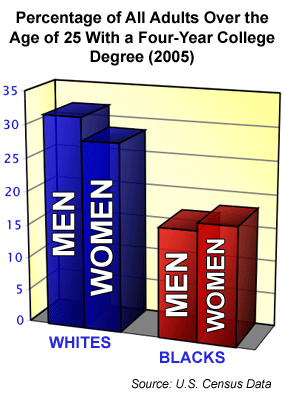

Comparing College Financial Aid Policies Around the Globe
A study by the Educational Policy Institute, a nonprofit group with offices in Australia, Canada, and the United States, finds that nonrepayable scholarship grants are the most effective means of increasing the number of low-income students who enroll in higher education. The study of financial aid policies in a number of developed countries found that need-based scholarship grants are the best bet to increase the economic diversity of the college student population.
Alex Usher, the author of the report entitled Grants for Students: What They Do, Why They Work, writes that “grants are required to entice low-income students into post-secondary education because a variety of factors, both real and perceived, lead them to underestimate the true long-term financial benefits of higher education.”
The report concludes that financial aid policies in Australia, New Zealand, and Great Britain take the right approach. But Usher is highly critical of American financial aid policies which spread the financial aid dollar across the entire socioeconomic spectrum. This is wasteful, according to Usher, because middle- and high-income students in these countries would pursue higher education even without government financial aid by simply taking on debt.
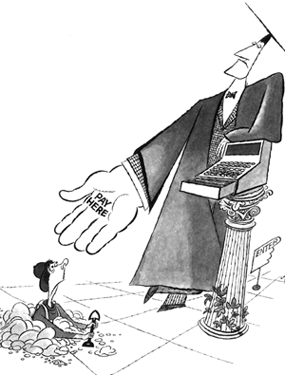

Marshall University Drops “Black Only” Restriction in Freshman Seminar
 All students entering Marshall University in Huntington, West Virginia, this fall will be required to take the course UNI 101. The course is a freshman seminar designed to ease a student’s transition to college life. Some sections of the course have a special focus such as on adult education or students with disabilities. Another section is geared to the problems of African-American students on a predominantly white campus. All students entering Marshall University in Huntington, West Virginia, this fall will be required to take the course UNI 101. The course is a freshman seminar designed to ease a student’s transition to college life. Some sections of the course have a special focus such as on adult education or students with disabilities. Another section is geared to the problems of African-American students on a predominantly white campus.
In the past, this special section of UNI 101 was restricted to African-American students. But the Foundation for Individual Rights in Education in Philadelphia sent a letter to Marshall University saying that the university was in violation of state and federal law by offering a course that was restricted to a particular racial group. Marshall decided to keep the special course on the transition to college life for African Americans but it opened up the course to students of all races who wanted to take it.
About 5 percent of the nearly 10,000 undergraduate students at Marshall University are black.

Black College Receives Go-Ahead to Begin MBA Program
 Florida Memorial University, the historically black educational institution in Miami, has announced plans to offer an MBA program beginning this coming January. The one-year MBA program recently received approval from the accrediting body, the Southern Association of Colleges and Schools. Florida Memorial University, the historically black educational institution in Miami, has announced plans to offer an MBA program beginning this coming January. The one-year MBA program recently received approval from the accrediting body, the Southern Association of Colleges and Schools.
The MBA program will be the fourth master’s degree program at the university.

Will a Black Republican Be the Next Mayor of the Big Apple?
 Richard Parsons, the CEO of Time Warner, has a contract to lead the media giant until the end of 2008. Rumors are rampant that at that time he will leave the company to run for mayor of New York City in 2009. Richard Parsons, the CEO of Time Warner, has a contract to lead the media giant until the end of 2008. Rumors are rampant that at that time he will leave the company to run for mayor of New York City in 2009.
Parsons, an African American, is a native of Brooklyn. He attended the University of Hawaii on a basketball scholarship, where he admits he spent more time partying than studying. But Parsons knuckled down in law school and earned the highest score on the New York State Bar Exam in 1971. He then became a protege of Nelson Rockefeller working with the long-time governor while Rockefeller served as vice president of the United States. Before coming to Time Warner in 1995, Parsons was CEO of Dime Savings Bank.
Parsons describes himself as a liberal Republican, conservative on economic issues but progressive on social issues, much like the current GOP mayor of New York City, Michael Bloomberg.

Black Panthers to Teach at the University of New Mexico
 David Hilliard, one of the founders of the Black Panther Party, will teach two courses this fall at the University of New Mexico. One course will be on how hip-hop music can be a force for social change. A second course will concern the history of African-American resistance movements in the United States with a particular focus on the Black Panther Party. David Hilliard, one of the founders of the Black Panther Party, will teach two courses this fall at the University of New Mexico. One course will be on how hip-hop music can be a force for social change. A second course will concern the history of African-American resistance movements in the United States with a particular focus on the Black Panther Party.
Elaine Brown, who chaired the Black Panther Party from 1974 to 1977, will serve as guest lecturer on several occasions during the semester.

  |
1,281 Total number of professional degrees in optometry awarded in the United States in 2003.
33 Total number of professional degrees in optometry awarded to blacks in the United States in 2003.
source: U.S. Department of Education
|
Appointments
• Malvin Williams was named interim president of Alcorn State University in the wake of the sudden death of university president Clinton Bristow Jr. Williams was an administrator at Alcorn State for many years before his retirement in 2005. It is expected that it will take six to eight months for a new president to be selected.
• Johnnie Watson, former superintendent of the Memphis, Tennessee, public school system, was named interim president of LeMoyne-Owen College, the historically black educational institution in the city. Watson’s main task is to improve the college’s financial situation. Last December the college was placed on probation by the Southern Association of Colleges and Schools because of its being $6 million in debt.
 • Cynthia Jackson-Hammond was appointed dean of the School of Education and Human Performance at Winston-Salem State University in North Carolina. She has served as interim dean for the past year. Previously, she was assistant dean of education at the University of North Carolina at Charlotte. • Cynthia Jackson-Hammond was appointed dean of the School of Education and Human Performance at Winston-Salem State University in North Carolina. She has served as interim dean for the past year. Previously, she was assistant dean of education at the University of North Carolina at Charlotte.
Jackson-Hammond is a graduate of Grambling State University. She holds a master’s degree in education from the University of Louisiana at Monroe and a doctorate in education from Grambling.

|



